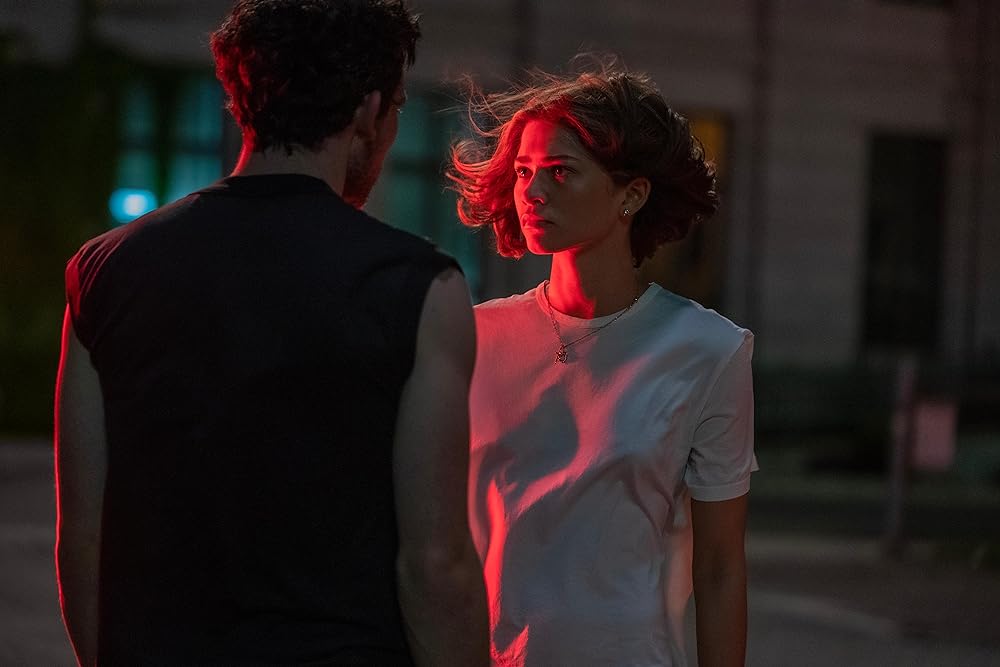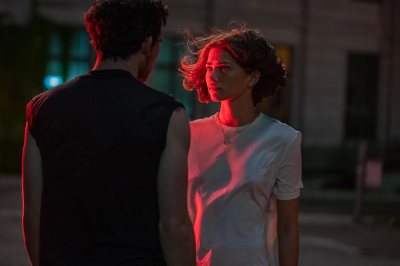Luca Guadagnino has a talent for twisting love into peculiar shapes. His recent films have employed unusual themes—Jewish identity in Call Me By Your Name (2017) and cannibalism in Bones and All (2022)—to explore the nature of sexual self-discovery. In Challengers, he continues that pattern by using the framing device of a tennis match to probe the most hackneyed of Hollywood plot devices: the love triangle. The result is a soapy, salacious film that’s both inescapably entertaining and marred by its jumbled presentation.
Our players are Tashi Duncan (Zendaya); her husband, Art Donaldson (Mike Faist); and Patrick Zweig (Josh O’Connor), Tashi’s ex-lover and Art’s former best friend. We’re introduced to the trio against the backdrop of a Challenger event—a second-tier tennis tournament taking place in New Rochelle, New York. Art is a tennis superstar on a losing streak after an injury who enters the competition at Tashi’s insistence to rebuild his confidence. He’s surprised to find that Patrick—who’s failed in his own quest for success as a professional player and now competes in low-level matches while living in his car—is also in the tournament. And as fate would have it, they’re pitted against each other in the final round.
Flashbacks reveal that Art and Patrick fell for Tashi as teenagers, when the three met while competing in the junior U.S. Open. Back then Tashi was a force of nature, a prodigy who seemed primed for future stardom. But after enrolling at Stanford to play college tennis, she suffered a knee injury that upended her plans. The incident alienated her from Patrick and pushed her toward Art. She became his coach, his wife, and the mother of his child. But Patrick’s sudden return makes clear that the romantic tension between him and Tashi was never fully resolved.
Guadagnino’s zestful direction is Challengers’ greatest asset. There’s a rich color palette on display throughout the film, which brings each scene to vibrant life. In many instances, he manipulates the camera deftly. One particularly inspired shot during Art and Patrick’s showdown focuses on Tashi in the stands. While those around her move their heads from left to right as they follow the ball, she is stationary, consumed by such anxiety that even her eyes are locked in place. Screenwriter Justin Kuritzkes’ dialogue largely avoids cliches and crackles with understated tension, but Guadagnino’s strong grasp of comic timing brings levity where appropriate. Accompanying the action is a throbbing electronic soundtrack by Trent Reznor and Atticus Ross that sounds like music for an intergalactic rave. It’s one of the film’s most captivating features, a fittingly intense companion to Art and Patrick’s sweat-drenched conflict.
Yet with all these stylistic flourishes, Guadagnino often appears to be compensating for deficiencies in the narrative. The film unfolds in constant flashbacks that jump abruptly between moments in time, but this florid presentation flimsily disguises the fact that the characters have little to do besides become increasingly frustrated with each other. Most scenes set away from the tennis court find them eating in restaurants while spouting exposition, none of which brings us closer to them. Tashi is callous and manipulative; her life is a trail of chaos, and Art and Patrick are hopelessly transfixed. But that chaos is scarcely reflected in the plot, which seldom strays beyond the obvious. When Challengers reaches its finale, it fails to stir a strong emotional response. Guadagnino seems to hope that his gimmicky technique of filming the climatic match from the ball’s perspective and numerous other disorienting angles will distract from this absence of feeling.
As Tashi, Zendaya is luminous. Her presence consumes every scene she inhabits. But her acting is barely a notch above robotic for much of the film despite her power over the camera. Thankfully, Faist and O’Connor deliver compelling performances as Art and Patrick. The former is stricken with insecurity over his direction in life, while the latter seems utterly self-assured despite his lack of success. They behave like antipodes that can’t help but be drawn to one another, and it soon becomes clear that this attraction isn’t entirely platonic.
There’s a clear homoerotic subtext to the early scenes of Challengers, but that latent element of the plot emerges as its driving force once a few more overt references are made. Blatant symbolism is littered throughout, and the central tennis match reveals itself as a sexual metaphor with multiple dimensions. Once these themes fully surface, however, they eclipse all of Guadagnino’s other ideas. Challengers examines themes such as loyalty and competition, and gestures toward grander musings on romantic fidelity and friendship. But whatever insights Guadagnino hoped to offer are drowned out by his fixation on lurid images of repressed homosexual desire and its attendant angst. He appears to take glee in the gratuitous, populating various scenes with sculpted male bodies that range from fully naked to half-naked to tightly clothed. If only this level of effort was applied to deepening Art and Patrick’s character arcs beyond their fundamental traits.
Despite these flaws, Challengers remains a slick and sumptuous film that entertains consistently. At its best, it’s a shot of pure adrenaline, a kinetic burst of color and passion that’s as intense as an exceptional tennis match. With a more robust central conflict and a greater clarity of vision for its characters, Challengers could have been a champion. Instead, it’s only on the level of a contender.






Please note that we at The Dispatch hold ourselves, our work, and our commenters to a higher standard than other places on the internet. We welcome comments that foster genuine debate or discussion—including comments critical of us or our work—but responses that include ad hominem attacks on fellow Dispatch members or are intended to stoke fear and anger may be moderated.
With your membership, you only have the ability to comment on The Morning Dispatch articles. Consider upgrading to join the conversation everywhere.